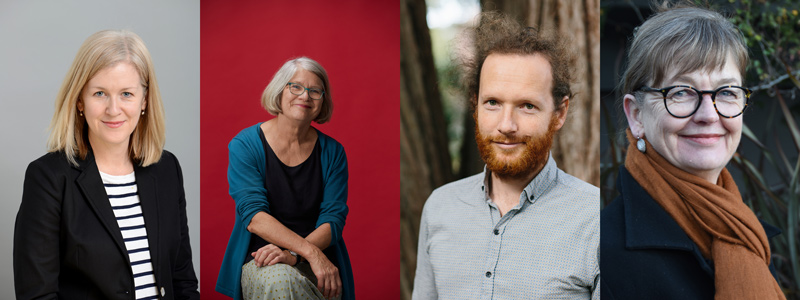2020 Ernest Scott Prize shortlist announced
The Ernest Scott Prize for History is awarded annually to the book judged to be the most distinguished contribution to the history of Australia or New Zealand or to the history of colonisation published in the previous year.
This prize is proudly supported by the history program in the School of Historical and Philosophical Studies, Faculty of Arts at the University of Melbourne.
Judges
The 2020 judges are:
- Associate Professor Paul Sendziuk, Department of History, University of Adelaide
- Professor Kate Hunter, Department of History, Victoria University of Wellington
The winner will be announced on the Faculty of Arts news page in early May.
2020 shortlist

Image caption: Michelle Arrow, Bettina Bradbury, James Dunk and Annabel Cooper
James Dunk, Bedlam at Botany Bay, NewSouth, 2019
It’s the history of New South Wales, but not as we know it. The names are familiar, as are the events – Macarthurs, Wentworths, Blaxland, Bligh, rebellion, inquiries, select committees – but by paying close attention to the ‘strong personalities’, ‘eccentricities’ and ‘unfortunate endings’, Dunk puts us in the mirror house, where all that was familiar now feels strange and illuminating of quite a different colony. This is more than a collective biography, a history of whitefella madness, or the bureaucratic and jurisdictional journey to self-government. Dunk’s book reminds us that there is nothing inevitable about how things turn out: this is a rare feat in history-writing. More information.
Michelle Arrow, The Seventies: The personal, the political and the making of modern Australia, NewSouth, 2019
In her intensely immediate and relevant history of the 1970s Michelle Arrow brings to light the astonishing politics of a remarkable decade. Using sources such as evidence to the Royal Commission on Human Relationships – an inquiry almost unthinkable in the contemporary political climate – Arrow illuminates how ‘the personal is political’ was a transformative and revolutionary catch-cry in Australian society. Far from nostalgia for an era of collective activism, Arrow reminds us of the achievements of those deeply committed to social change and does not shy away from the deeply painful, difficult and personal divisions of the identity politics of the time. More information.
Bettina Bradbury, Caroline’s Dilemma: A Colonial Inheritance Saga, New South, 2019
Bettina Bradbury brings career-long expertise in nineteenth-century women and the law to bear on Caroline Kearney: a woman about whom almost nothing would have been known had she not been married to a tyrant determined to govern her life from beyond the grave. Caroline’s Dilemma is two stories. One of an English child-immigrant who married a pastoralist, moving between colonies, bearing and raising her children before being widowed and finding herself the subject of dramatic demands laid out in her husband’s will. The second story is that of a historian and her craft in the face of a complete absence of sources produced by Caroline herself, and yet with a story that demanded to be told. The result is a compelling book. More information.
Annabel Cooper, Filming the Colonial Past: The New Zealand Wars on Screen, Otago University Press, 2018
Annabel Cooper’s wonderfully written and beautifully produced book guides the reader back and forth across time, illustrating deftly how the past remains alive in its re-telling. It is at once a history of a century of producing and watching cinema, television and music videos in New Zealand, a fascinating glimpse into Māori-Pākehā relations in the creative arts, and an illustration of the deep and still-visceral impact of the wars on iwi. A decade in the writing and well worth the wait, Cooper’s book prompts us to take popular culture seriously as a vehicle for history-making and history-knowing. More information.